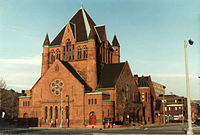Ecumenical Theological Seminary
Former name | Ecumenical Theological Center |
|---|---|
| Type | Private seminary |
| Established | 1980 |
| President | Kenneth E. Harris |
| Students | 43 |
| Location | , |
The Ecumenical Theological Seminary is a private seminary in Detroit, Michigan. Founded in 1980 as the Ecumenical Theological Center, the seminary offers graduate degrees and certificates in religious studies. It is housed in a building built in 1889 to house the First Presbyterian Church; the seminary began leasing the building in 1992 and was donated the building, lands, and endowment in 2002.
History
[edit]The seminary traces it roots to the Institute for Advanced Pastoral Studies, an institution founded in 1957 to provide continuing education for Christian ministers. This institution merged with the Ecumenical Theological Center in 1980. In 1994, the center changed its name to the Ecumenical Theological Seminary and began offering an academic credential (the "Diploma in Christian Ministry" now the "Urban Ministry Diploma Program"). Three years later, the seminary began the process of gaining accreditation from the Association of Theological Schools. In 2002, after allowing the seminary to lease the former First Presbyterian Church for ten years, the Presbytery of Detroit gave the seminary the building, its grounds, and it endowment.[1]
Academics
[edit]The Ecumenical Theological Seminary awards Master's degrees, Doctoral degrees, and certificates in religious studies and ministry.[2] The seminary is accredited by the Association of Theological Schools.[3]
Campus
[edit]First Presbyterian Church | |
 First Presbyterian Church seen from across Woodward | |
| Location | 2930 Woodward Avenue Detroit, Michigan |
|---|---|
| Coordinates | 42°20′39″N 83°03′18″W / 42.34418°N 83.05510°W |
| Built | 1889 |
| Architect | George D. Mason & Zachariah Rice |
| Architectural style | Richardsonian Romanesque |
| NRHP reference No. | 79001174[4] |
| Significant dates | |
| Added to NRHP | December 19, 1979 |
| Designated MSHS | August 3, 1979[5] |
The seminary occupies and owns the building and lands that were originally the First Presbyterian Church. It was built in 1889 and is listed on the National Register of Historic Places, is a designated Michigan State Historic Site (1979), and a contributing property to the Brush Park Historic District.[4][5]
Architecture
[edit]George D. Mason and Zachariah Rice modeled the First Presbyterian Church after Henry Hobson Richardson's Trinity Church in Boston.[6][7] The church, in the Richardsonian Romanesque style, is made from rough-cut red sandstone, with the floorplan in the shape of a Greek cross. Masonry arches support a red sandstone tower with a slate roof and turrets at each corner. The stained glass windows of the church are exceptional, with many of Tiffany glass.[7]
When Woodward was widened in 1936, the elaborately-carved entrance porch was moved from the Woodward façade to the Edmund Place side.[6][7]
A State of Michigan historical marker was placed at the site on August 26, 1980.[8]
Gallery
[edit]- First Presbyterian Church, c. 1899
- The church in 2004. Notice the massive rearrangement of the Woodward façade
See also
[edit]- First Presbyterian Church (Detroit, Michigan), the historical building and lands occupied by the seminary
References
[edit]- ^ Ecumenical Theological Seminary (2018). "Our History". Retrieved February 16, 2018.
- ^ Ecumenical Theological Seminary (2018). "Academics". Retrieved February 16, 2018.
- ^ Association of Theological Schools (2018). "Member schools - Ecumenical Theological Seminary". Retrieved February 16, 2018.
- ^ a b "National Register Information System". National Register of Historic Places. National Park Service. January 23, 2007.
- ^ a b "First Presbyterian Church". Michigan State Housing Development Authority. Archived from the original on May 17, 2012. Retrieved September 1, 2010.
- ^ a b Hill, Eric J. & John Gallagher (2002). AIA Detroit: The American Institute of Architects Guide to Detroit Architecture. Wayne State University Press. ISBN 0-8143-3120-3. p. 110.
- ^ a b c "Untitled Document". Archived from the original on December 15, 2007. Retrieved March 22, 2008.
- ^ "Michigan Historical Marker: First Presbyterian Church". Michmarkers.com. Archived from the original on February 13, 2001. Retrieved March 6, 2012.


 French
French Deutsch
Deutsch



